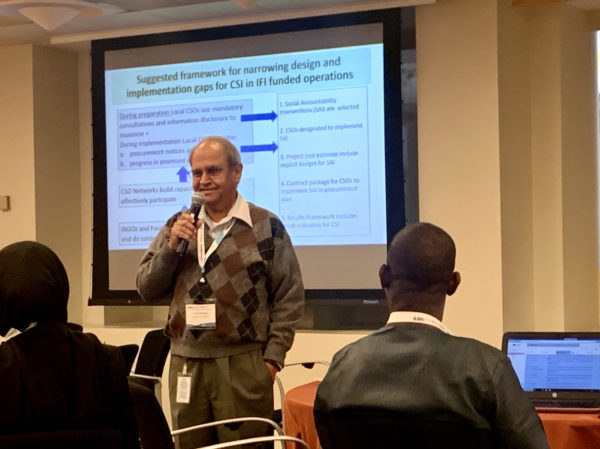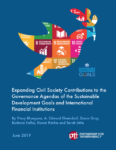
In a Lunch & Learn session at the 2019 GPSA Forum, PTF presented ideas to maximize CSO engagement and accelerate progress towards SDG16 in operations funded by International Financial Institutions (IFIs). The event featured PTF’s Chief Technical Advisor, Vinay Bhargava, and was moderated by PTF President Richard Stern, with about 50 participants of the Forum from around the world.
PTF kicked-off the discussion drawing on its recent study, Expanding Civil Society Contributions to the Governance Agendas of Sustainable Development Goals and International Financial Institutions.
Dr Bhargava noted that “all IFIs have policies and give certain rights to CSOs unlike many governments” which provide entry points for their engagement. However, he explained, both “design” and “implementation gaps” hampers universal application of social accountability programs despite commendable targets, such as SDG16. He explained, “what civil society and social accountability can do for development projects is not integrated to the maximum possible extent in the design, that’s the design gap, and even what little is integrated doesn’t get implemented always and that is the implementation gap.”
“In any project, whether it is health, education, water, transport, energy, you name it, there is a potential contribution of CSOs and social accountability that can improve the results… but what we know civil society can do is not recognized by the [World Bank] Task Team Leaders or the Project Teams who design these projects. As a result, what is designed into the project is far below the potential of what CSOs can do,” said Dr Bhargava. “If only the design gap could be closed, in hundreds of millions of dollars being financed around the world, think about how much impact social accountability could make.”
Dr Bhargava was also quick to point out that “just because the project appraisal document says that there will be third party monitoring or beneficiary feedback collection, does not necessarily mean it always gets done.” He noted that in order to fully integrate social accountability interventions in IFI-funded programs, IFIs must: select a social accountability intervention, designate CSO to implement it, include the activity in the budget and have that translated into procurement package reserved for award to CSOs, and include indicators for social accountability in results frameworks.
He encouraged CSOs present to push IFIs to close both design and implementation gaps by bringing cases to IFI grievance redress mechanisms, such as the World Bank’s Inspection Panel, seek engagement in Environmental and Social Frameworks and utilize IFI Access to Information policies.
“Every [World Bank] project must have an anti-corruption plan and that gives you entry points for social accountability. As you know social accountability has been proven to reduce corruption, whereas government effort to control corruption has not been successful. So have can you have zero tolerance for corruption and have no social accountability mechanism in a project you are financing? I want you to ask that of IFIs,” said Bhargava.
Dr Bhargava’s presentation was followed by a question and answer session moderated by PTF President, Richard Stern. Discussion centered around World Bank data transparency issues, sustainable funding, and bottom-up programming.
PTF is exploring idea of creating a working group of interested participants and other CSOs to carry the discussion forward. “If you’re interested in pursuing some of these ideas we at PTF would be more than interested to help you,” noted Mr Stern.
To get in contact with us, email info@ptfund.org.



“Expanding Civil Society Contributions to the Governance Agendas of Sustainable Development Goals and International Financial Institutions” reviews more than 40 studies to distill information from hundreds of cases and sources on the primary factors influencing the effectiveness of civic engagement to improve governance. The evidence reveals that CSOs have been successful in producing positive governance outcomes, but this is highly dependent on context.


